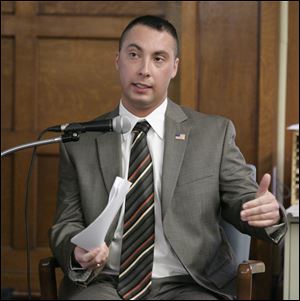
Ottawa Hills officer conviction for 2009 felonious assault reversed
1/11/2013
Ottawa Hills police officer Thomas White testifies during his trial in Lucas County Common Pleas Court in Toledo, on Thursday, May 13, 2010.
The conviction of a former Ottawa Hills police officer found guilty for shooting and paralyzing an unarmed motorcyclist was reversed, the Sixth District Court of Appeals ruled today.
Thomas White, 30, of Toledo was found guilty by a jury in the courtroom of Lucas County Common Pleas Judge Gary Cook on May 14, 2010, of felonious assault with a gun specification for the May, 2009, shooting of Mike McCloskey. After a week-long trial, the jury deliberated for about six hours before reaching a verdict.
Mr. McCloskey was paralyzed from the waist down as a result of the shooting.
In a 2-1 opinion, the appellate court reversed the verdict and remanded it back to common pleas court for a new trial, saying that the jury was not given proper instructions of law. The court also dismissed the gun specification with prejudice meaning even if the case is retried, White can not be charged with the additional specification. A gun specification is punishable by a mandatory prison sentence of three years.
Judge Stephen Yarbrough wrote the 108-page opinion which was joined by Judge Peter Handwork. Although agreeing on some points, Judge Arlene Singer dissented with the majority on their reasons for reversal.
White, who has remained free on bond pending his appeal, argued six claims in his appeal filed in March, 2011. Among those was that the officer was acting under a good faith mistake and so should have immunity from criminal prosecution. Also argued was that the convictions were legally insufficient because he did not act knowingly to harm.
Judges Yarbrough and Handwork disagreed that White had immunity from criminal prosecution nor that there was insufficient evidence to convict on the elements on the charge of felonious assault. However, the pair agreed with White’s attorney that the jury was not given the proper instructions on deadly force nor were the jurors given proper instructions on the issue of “mistaken belief.”
“This is not just an academic error,” the opinion stated. “Because the jury was improperly instructed on [the issue of deadly force standard], reverse is required.”
The court further found that “a separate instruction on mistaken belief” should also have been included in jury instructions.